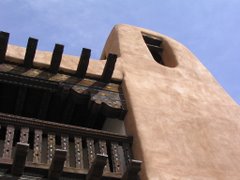-- Mark Shelley: Strange Days on Planet Earth
Tuesday, April 15, 2008 7 p.m.
-- Elizabeth P. Turtle: Saturn Lecture and Observing
Friday, April 18, 2008 7 p.m.
-- Tom Williamson, Ph.D.: Mass Extinction--A KNME Science Café
Saturday, April 26, 2008 10 a.m.
Strange Days on Planet Earth
Mark Shelley
Tuesday, April 15, 2008 7 p.m.
Co-sponsored with KNME-TV, New Mexicans for Science and Reason and Coalition for Excellence in Science and Math Education
"Strange Days on Planet Earth" is a unique production that integrates cutting-edge research, state of the art graphics, and globe spanning investigations, all presented as a high-tech detective story. In partnership with National Geographic, the program raises public understanding about how individuals are interconnected to our planet's life systems. The inaugural PBS series, hosted by Academy-award nominated actor Edward Norton, earned 14 major film festival honors. This April a new season will focus on global ocean and freshwater issues. Join the producer of this series for a unique preview and behind-the-scenes stories about this special program.
Mark Shelley is Executive Director of Sea Studios Foundation. He has used film-making to spotlight some of the most pressing issues of our times - from climate change to invasive species, from the loss of biological diversity to the loss of large predators and landscape fragmentation, and the vital role of our oceans in Earth's life support systems.
He is internationally recognized for his underwater filmmaking skills. Mark is an expert diver, submersible pilot, and airplane pilot.
Cost: $2 public/$1 members, seniors, students
Airing on KNME-TV Wednesday, April 23rd at 9:00 p.m.
Saturn Lecture and Observing
Elizabeth P. Turtle
Friday, April 18, 2008 7 p.m. in the Planetarium
Learn about the latest discoveries from the Cassini mission to Saturn! Elizabeth P. Turtle, a Planetary Scientist at the Johns Hopkins University Applied Physics Lab and a member of the Cassini Imaging Team, will speak in the Planetarium on Friday, April 18 at 7 p.m. After the lecture (weather permitting), we'll view the ringed planet in our observatory.
Cost: $12 adults and seniors 60+, $10 members, $5 for students 18+ and children 3-17
Tickets available online, only at: http://naturalhistoryfoundation.org/saturn.html
Mass Extinction
Tom Williamson, Ph.D.
A KNME Science Café
Saturday, April 26, 2008 10 a.m.
What caused the greatest mass extinction in the history of multi-cellular life? Way back before dinosaurs, 250 million years ago, nearly 90% of all life on Earth died. A Nova Science Now segment will show us a half-dozen plausible theories, then we'll have a discussion with Dr. Tom Williamson. The Museum's newest exhibition on the Triassic, opening on May 17th, will include this extinction event. Refreshments will be served.
Tom Williamson, Ph.D. has been Curator of Paleontology at the New Mexico Museum of Natural History and Science for over 14 years. His recent research has looked at the fossil record spanning the Cretaceous/Tertiary extinction event at the end of the Age of Dinosaurs and the beginning of the Age of Mammals.
Hosted by KNME-TV5 with support from Lockheed Martin/Sandia National Laboratory.
Free, but reservations are required. Call Chris Sanchez at 841-2872, chris.sanchez@state.nm.us
Tickets are going fast-get yours now!
Jack Horner, Ph.D.
Tuesday, May 13, 2008 7 p.m.
Noted paleontologist Dr. Jack Horner will be speaking at the Museum in May. He is Curator of Paleontology at the Museum of the Rockies, Regents Professor at Montana State University in Bozeman, Montana, and is Adjunct Curator at the National Museum of Natural History. Dr. Horner discovered the first dinosaur eggs in the Western Hemisphere, the first evidence of dinosaur colonial nesting, the first evidence of parental care among dinosaurs, and the first dinosaur embryos. Dr. Horner's research covers a wide range of topics about dinosaurs, including their behavior, physiology, ecology, evolution, and growth rate. His recent work has been on soft tissue analysis from a very rare Tyrannosaurus find with actual dinosaur proteins preserved in the core of a leg bone. In 2007, he headed an expedition to the Gobi Desert collecting more than 80 skeletons of Psittacosaurus. He has named several dinosaurs and had two dinosaurs named for him. A recipient of the MacArthur Fellowship "genius grant," Dr. Horner has dyslexia and hopes to inspire young people with learning differences about what can be achieved with persistence and support. He was a technical advisor on all the Jurassic Park movies as well as being the real scientist on which the character Dr. Alan Grant was loosely based.
Tickets: $12 adult/ $10 members & seniors/ $5 students plus on-line service charge.
Tickets are available on line at: www.NaturalHistoryFoundation.org/horner.html
Advance tickets are available online only. Online ticket sales will end 4 hours prior to the talk. Any unsold tickets can be purchased the night of the talk at the Museum beginning at 4:30 p.m.
Tickets will not be sold over the phone or at the Museum prior to that evening.
All tickets are non-refundable.
All talks are at the New Mexico Museum of Natural History & Science
1801 Mountain Rd NW, Albuquerque, NM 87104
505-841-2800
Check our website at: www.NMnaturalhistory.org
Questions? Call Tish Morris at 505-841-2882.
You may reserve tickets (for all but Jack Horner and Saturn talk) by contacting Chris Sanchez at 841-2872, chris.sanchez@state.nm.us
Tish Morris
Senior Education Specialist
New Mexico Museum of Natural History & Science
1801 Mountain Rd NW
Albuquerque, NM 87104
505-841-2882
tish.morris@state.nm.us
www.NMnaturalhistory.org
Subscribe to:
Post Comments (Atom)

No comments:
Post a Comment